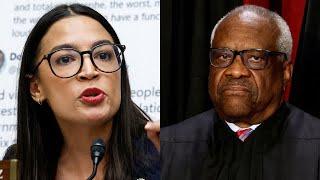Representative Alexandria Ocasio-Cortez has set the political landscape ablaze with a groundbreaking announcement that she intends to draft and introduce articles of impeachment against Supreme Court Justice Clarence Thomas. This revelation has sent shockwaves through Washington and ignited fierce debate across party lines. In her statement, Ocasio-Cortez cited what she described as “clear and repeated violations of judicial ethics and the public trust,” asserting that no one, not even a Supreme Court Justice, is above the law.

This move follows months of escalating scrutiny surrounding Justice Thomas’s conduct and alleged failure to disclose financial ties and gifts from wealthy donors with interests before the Court. Critics argue that these actions compromise the perceived impartiality of the nation’s highest court, potentially eroding the foundational trust upon which it stands. Ocasio-Cortez, a progressive Democrat from New York and a high-profile member of the so-called “Squad,” has long been vocal about her concerns regarding the integrity of the judiciary. But this marks her most aggressive and consequential step yet.

In her announcement, she emphasized the gravity of the moment. “We are witnessing a crisis of legitimacy in the Supreme Court,” she said. “When a Justice engages in conduct that raises credible questions about their impartiality and fitness to serve, the House of Representatives has a constitutional duty to act.” She further added that while the judiciary is meant to be an independent branch, independence does not mean impunity.
The impeachment process, as laid out in the Constitution, begins in the House of Representatives. If the articles are introduced and supported by a majority vote, the case would then move to the Senate for a trial. The odds of a successful impeachment and removal, however, are exceedingly slim given the current composition of the Senate and the historically high threshold required for conviction—two-thirds of Senators must vote in favor.
Nonetheless, the symbolic and political weight of such a move cannot be underestimated. Ocasio-Cortez’s announcement has already triggered a torrent of reactions. Some Democrats have rallied behind her call, suggesting that it is time to confront what they see as systemic failures in the Court’s ethical oversight. Others, even within her own party, have expressed concern that the move could be seen as overly partisan and could backfire politically, especially heading into the next election cycle.
Republicans have been quick to denounce the move. Several GOP lawmakers characterized it as a “political stunt” aimed at undermining the credibility of a conservative-majority court. Senate Minority Leader Mitch McConnell released a statement condemning the action as “reckless and baseless,” warning that it could further erode public faith in American institutions. Meanwhile, right-wing media outlets have begun framing the announcement as an attack on judicial independence and a distraction from other pressing national issues.
Legal experts are divided on the matter. Some constitutional scholars argue that impeachment should only be reserved for criminal behavior or gross misconduct, not ethical lapses, however serious. Others, however, believe that the pattern of undisclosed financial entanglements and the appearance of bias could indeed constitute grounds for impeachment under the broad definition of “high crimes and misdemeanors.”
The broader public response remains to be seen, but the issue is already dominating headlines and sparking heated discussions online. The announcement taps into deeper anxieties about the politicization of the judiciary and the lack of enforceable ethical standards for Supreme Court Justices, who are appointed for life and operate largely without external oversight.
In recent years, calls for reform have grown louder, including proposals to impose term limits, enforce stricter disclosure requirements, or establish an independent ethics body to monitor judicial conduct. Ocasio-Cortez’s move may serve as a catalyst for further discussion on these fronts, regardless of whether the impeachment effort succeeds.
For now, the country watches as a bold challenge to the power and accountability of the Supreme Court unfolds—one that could define not only Ocasio-Cortez’s political legacy but also the future balance of trust in the American democratic system.






